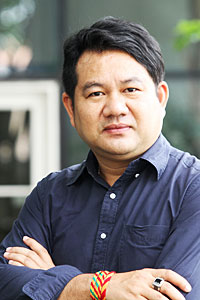
The call by a Buddhist network in the deep South for the prime minister to use his special Section 44 power to deal with the insurgency is sending an important signal to the authorities: they are losing hope, confidence and belief in the peace process and the efforts to tackle the violence.
Admittedly, the violence in the far South has escalated this month. Three shocking incidents occurred on a single day, March 2. A family of four, including an 8-year-old boy, was shot dead on their way to a school in Rueso district, Narathiwat. Peace groups, human rights defenders, the National Human Rights Commission and the government condemned the attack with some considerable emotion.
That same day in Pattani's Mayo district, three non-commissioned soldiers were gunned down at a flea market in Ban Tabae of tambon La-nga while a security guard was shot dead in Ban Buketkong village of tambon Lubo Yirai.

Anucha Charoenpo is news editor, Bangkok Post.
In all, these three incidents claimed the lives of eight innocent people, prompting the Buddhist groups to send a signal to those in charge of solving the southern problem: they want a return to normal as soon as possible.
Led by Somnuek Rakang, chairman of the network which comprises more than 300 Buddhist leaders and activists in the far South, on March 3 met authorities at the Southern Border Provinces Administration Centre (SBPAC) in Yala. They exchanged opinions on how to quell the southern violence. Then, they submitted their proposals to the prime minister via the SBPAC.
Their proposals include the need for authorities to bring perpetrators of violence to justice, and a call for the state to stop the peace negotiations with Mara Patani, an umbrella body of insurgent groups in the deep South, which so far has involved several rounds of talks in Malaysia.
More importantly, the group proposed the prime minister, in his capacity of the leader of the National Council for Peace and Order (NCPO), invoke Section 44 of the interim charter to tackle the insurgency in the Muslim-dominated provinces of Yala, Pattani and Narathiwat and reduce the amount of violence in the region.
Section 44 empowers Gen Prayut to issue orders for the sake of reforms, the promotion of love and harmony, or the prevention, abatement or suppression of any act detrimental to national order or security, the royal throne, national economy or public administration.
Based on such a definition, the Buddhist groups may think that the use of Section 44 can effectively help ease tensions and reduce the severity of the attacks experienced in the deep South for the past 13 years.
However, they may forget the reasons for invoking Section 44 vary, depending on circumstances, as its prime objective is to guarantee safety of the people and property and prevent violence and unrest in the country.
Section 44 must not be applied to suppress the violence in the deep South because martial law and the Executive Decree on Public Administration in Emergency have already been imposed to quell insurgencies for more than a decade.
Under these laws, security authorities can arrest and detain persons suspected of crimes against the national security without arrest warrants.
In addition, the Buddhist groups must be aware that Section 44 is not a magic pill that will cure all problems in just the blink of an eye, especially the violence in the deep South.
I do agree if the prime minister invokes Section 44 for the sole purpose of development work in the restive region such as setting up the 13-member special government delegation last year which will pool together various efforts of government bodies to solve the southern problems.
The government delegation is chaired by Deputy Defence Minister Gen Udomdej Sitabutr and works in line with policy directives of the Prime Minister and Defence Minister Prawit Wongsuwon.
Fortunately, the government has stated it will not use Section 44 to tackle the violence, noting the existing laws being enforced there are sufficient to bring the situation under control.
Apart from law enforcement, both past and present governments have adopted different measures to tackle the problems.
They have injected billions of baht into development work and efforts to improve the livelihoods of the people, and the military's operations to suppress insurgent groups.
But the question that remains is why peace has not yet been restored.
The violence, which surged back to life in January 2004 with the weapons theft at a military camp in Narathiwat and has continued for 13 years, has resulted in more than 6,800 deaths, mostly of civilians, and injury to almost 12,000 locals and officials, according security intelligence.
No matter the reason behind the move of the Buddhist groups, I feel they want to show that they disagree, quite strenuously, with the government's measures and law enforcement.
They also want to tell all stakeholders, especially the authorities, they are losing patience along with their hopes and their belief in law enforcement.
Meanwhile, authorities keep saying that much progress has been made to bring about peace in the far South.
I have sympathy for both Buddhist and Muslim people residing in the deep South as any one of them could be the next victim.
All of their lives hang in the balance pretty much all of the time. Whenever they to go out or stay at home, they need to take extra care as they are more likely to be hurt or killed by southern insurgents.
To bring peace to the deep South, both Buddhists and Muslims must be more united than ever to prevent insurgency groups from carrying out further attacks by providing their full support in terms of information sharing for the government's peace-building process and security operation.
At the same time, authorities must work to win ''the hearts and minds'' of the locals and enforce the laws fairly.
And everybody must exercise utmost patience to see that peace will really happen one day in the future.
